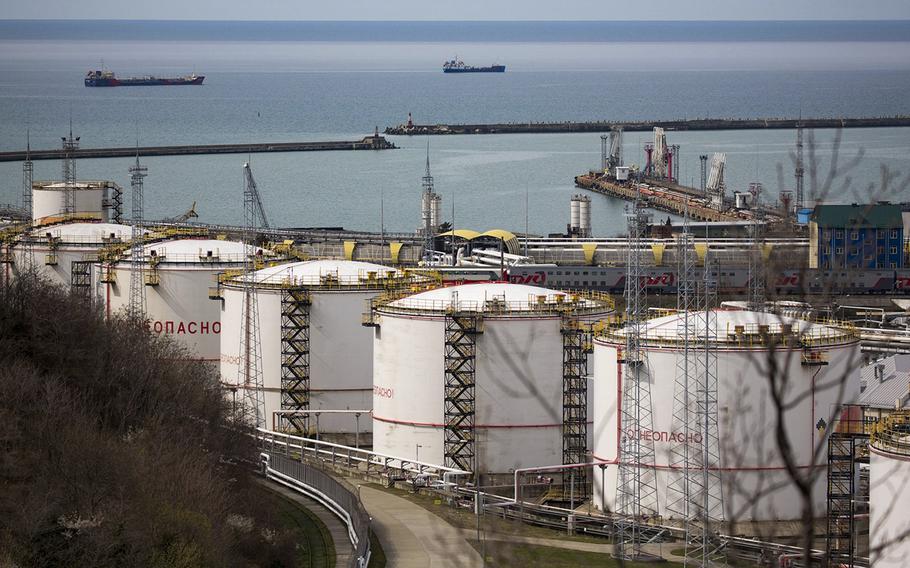
Oil storage tanks stand at the RN-Tuapsinsky refinery, operated by Rosneft Oil Co., as tankers sail beyond in Tuapse, Russia, on Monday, March 23, 2020. (Andrey Rudakov/Bloomberg)
Russia plans to cut its oil output by 500,000 barrels a day next month, following through on a threat to retaliate against Western energy sanctions and sending oil prices sharply higher.
The move threatens to renew turmoil in the oil market, which had so far taken disruption to Russian supplies in stride. It further tightens supply constraints from OPEC+, which Saudi Arabia had already led into a 2 million barrel-a-day production cut last year in an effort to buoy prices. Delegates from the group signaled they won't take any action to fill in the gap created by Russia.
Crude prices jumped on the news, with global benchmark Brent trading 2.2% higher at $86.34 a barrel by 12:22 p.m. in London. Before this week, the international benchmark had dropped 9% since mid-January, helping to ease inflationary concerns.
Russia's reduction is equivalent to about 5% of its January output. The Kremlin has repeatedly hinted at such a move since the European Union and the Group of Seven industrialized countries began discussing capping the price of Russian crude and refined product exports amid the war in Ukraine.
"Russia believes that the mechanism of price caps on Russian oil and petroleum products is an intervention in market relations and an extension of destructive energy policies of the collective West," Deputy Prime Minister Alexander Novak said in a statement on Friday. His press service confirmed that crude output will be affected by the cuts.
Since the imposition of E.U. import bans and the price cap "most observers expected some output loss, and Moscow may just be attempting to portray a compulsory cut as a voluntary policy choice," said Bob McNally, president of Rapidan Energy Group and a former White House official. "I doubt Russia's OPEC+ partners were taken by surprise and do not expect the supply reduction will alter their 'stay put' policy stance."
In the short term there is nobody to fill the supply gap created by the Russian cuts, said Giovanni Staunovo, an analyst at UBS Group.
As of now, Russia is able to sell its oil volumes to foreign markets, but it does not want to adhere to the price restrictions imposed by Western nations, according to Novak. "When making further decisions, we will act based on how the market situation is developing," he said.
The Russian cuts are unlikely to affect global oil prices in the longer term, according to Viktor Katona, crude analyst at Kpler. The reduction so far has only been announced for March and Russia's output could rebound after that, he said.
Given the nation's ability to export crude amid sanctions, the production cuts may lead to lower refinery runs while supplies to foreign clients could remain robust, Katona added.
It also might take longer than a month for Russia to redistribute the crude oil and product volumes that have been freed up as a result of Europe's import bans, said Sergey Vakulenko, a veteran Russia oil expert with the Carnegie Endowment for International Peace.
"Then Russia might continue the production cut and accompanying PR campaign," he said.
Russian oil production has been surprisingly resilient, amid several waves of energy restrictions imposed by western nations and their allies.
Since hitting a post-invasion low of 10.05 million barrels a day in April, Russian oil output rebounded to around 10.9 million at the end of 2022. It stayed close to that level in January, despite the European Union's ban on most seaborne imports of the country's crude on Dec. 5.
Still, Moscow's oil revenue has taken a hit in recent months amid the price caps and generally lower global crude prices. The discount at which Urals crude - Russia's main export grade - trades to the international benchmark has also widened, as the country seeks out new markets and alternative methods of shipment in the face of sanctions.